TERRITORY vet Stephen Cutter has vaccinated more than 20,000 animals in remote communities across the NT. As a child growing up in Central Australia, Stephen’s future was guided by the horrors he saw as a boy, as LAUREN ROBERTS explains
The deep sound echoes through the tiny room but Stephen Cutter doesn’t hesitate as he approaches the enclosure.
The freshie is agitated, annoyed — the rumbling sound is a warning.
She’s telling him she doesn’t want a check-up, she wants to be left alone.
As the 1.5m croc flicks her tail in an attempt to intimate him, the experienced Territory vet simply wraps his hands around her.
The creature itself is no stranger to Stephen — she lived in a cage at the Animal Ark Vet until she outgrew the small space.
He was the one who took the rescued creature in nearly 10 years ago and gave her a new home.
And while the freshie now lives in a much larger space, Stephen still gives her regular check-ups.
The familiarity doesn’t fool him. Stephen knew if her mouth wasn’t taped shut, the crocodile wouldn’t hesitate to sink her sharp teeth into his skin.
Still, he smiles at the beast and strokes her soft underbelly. Assures her it will be okay.
Stephen is the head vet at The Ark, a clinic on the outskirts of Palmerston which he founded in 2006.
It’s a busy practice, treating everything from pampered pet dogs to rescued wildlife to irritated crocodiles.
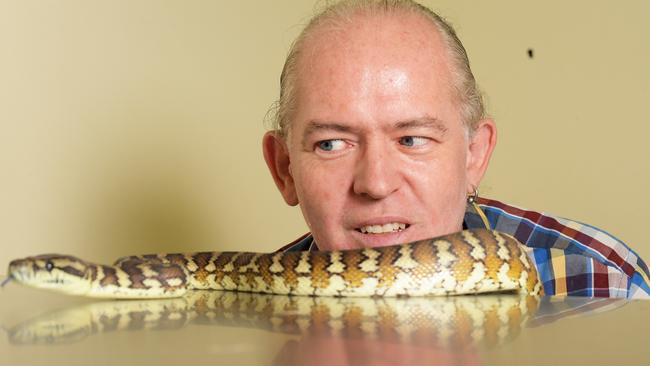
If you asked Stephen today, he couldn’t imagine doing anything else but caring for Territory animals.
But as a boy, Stephen was adamant he had no interest in a career as a veterinarian.
“Everyone else would have said ‘yes you’re going to be a vet’,” he laughs.
“Because everyone said it, I said ‘no I didn’t’ just to be difficult.”
He had always loved animals, though.
“My other siblings and my parents are definitely interested in them, but none of them like them more than is reasonable,” Stephen says.
“I crossed the line from a reasonable animal person into crazy.”
Stephen’s childhood memories were made on the red dirt of Central Australia.
Born February 2, 1972, Stephen was the second of six kids.
Growing up, his house was a busy one — father Trevor was a doctor and mother Pat worked hard to keep the peace between the energetic Cutter siblings.
The family was based in Alice Springs, a wonderful place to grow up if you have a facination with animals.
“There’s frogs and lizards under ever rock; and there’s lots of birds and lots of wildlife,” he says.
“My parents were very tolerant and let me have quite the menagerie.”
Trevor was a doctor with Central Australian Aboriginal Congress, and his work took him to right across the Red Centre.
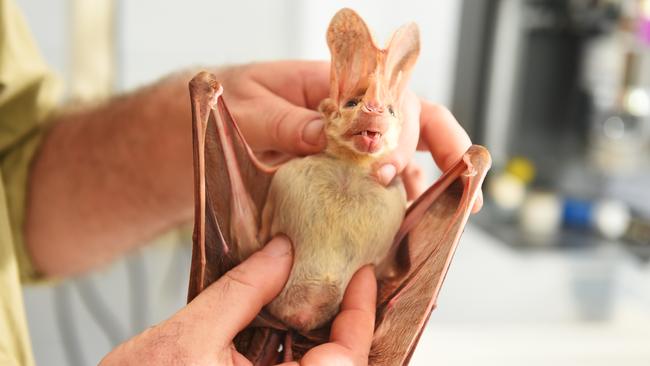
Stephen remembers his father taking the family of eight to remote communities when he travelled.
It was there Stephen first set his eyes on a camp dog, and realised how sick and poorly cared for some of the animals were.
When Stephen was about 15, the family left the warmth of Central Australia for a fresh start in Melbourne.
In Victoria, less than three years later, his dad died of cancer.
The pain of losing his father encouraged Stephen to pursue a veterinary career — a future he’d always wanted in his heart but had never embraced.
In 1991, he enrolled in University of Melbourne.
As he walked on campus for the first time, soaking in the tall brick buildings and lush green grass — Stephen knew his degree would take him back to the Territory bush.
Sure enough, one year after graduating, he boarded a plane to the NT.
A friend had organised for him to do a fortnight of dog programs in East Arnhem Land.
But those two weeks quickly snowballed into five months, as each community kept asking Stephen to visit the next.
For a few years, the vet split his time between Melbourne and the NT.
In the Dry, he’d travel across the Territory, helping care for the animals in need.
In the Wet, he’d head back to Melbourne and work casually with animal welfare societies.
But 20 years ago, it wasn’t as easy as walking up to a family and offering help.
“A lot of the communities had never had vets before and in the past, if an outsider paid attention to your dogs one way or the other they were trying to kill them,” Stephen says.
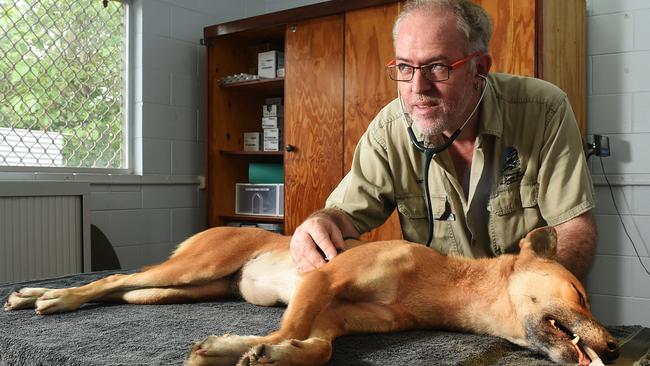
In the early days, a lot of the work was educating locals about what vets did and building relationships.
“It was quite a challenging time,” he says.
“A lot of the time, I did the surgery at people’s houses because they needed to watch to make sure I wasn’t going to run off with their dogs or anything like that.”
When Stephen started his canine program, the average life expectancy of a dog living in an uncontrolled community was less than a year.
He was only 25, just out of university and the enormity of the task at hand was overwhelming. The young vet was working primarily by himself, in partnership with environment health officers and local community members.
Stephen also had to lug all the equipment for surgery with him — including an anaesthetic machine and an oxygen cylinder — as well as the drugs and workbooks.
“Twenty years ago when I started all this I didn’t see any dogs with arthritis or skin cancer or cataracts, which are all diseases of old age,” Stephen says.
“None of the dogs were getting old enough to get those things — they were all dying of other things.”
But Stephen’s persistence has paid off.
To date, he has desexed more than 20,000 dogs.
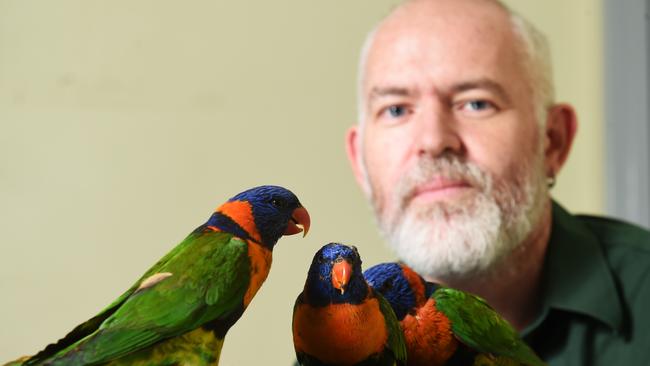
He still travels to remote Territory towns, and says now it’s rare to see the really unwell dogs that used to roam through the communities.
Now, Stephen’s focus is on making sure the desexing program is sustainable long term.
“It’s one of those things like cutting the grass in the wet season, if you stop it’ll stop and I guess one of the things that I’m most proud about is a charity that I founded that has taken on some of that on, and made it sustainable.”
In 1999, Stephen moved back to Darwin full time. By 2006, he had opened the Ark.
His vision was simple.
He wanted to keep providing dog health programs to remote communities; he wanted to treat injured wildlife and connect animals with foster carers; and he wanted to provide a really good vet care to people of the Top End.
The Ark works with Top End Rehoming Group, treating surrendered animals and helping find them new homes.
In the early days of the clinic opening, staff members would go out and pick up injured or lost wildlife from people’s houses themselves.
Today, this work is done by hardworking volunteers at Wildlife Rescue Darwin — volunteers who dedicate their spare time to rescuing, rehabilitating and releasing Australian native wildlife.
Stephen and vets are the Ark still treat the injured creatures, with about 3000 wild animals brought to the clinic every year.
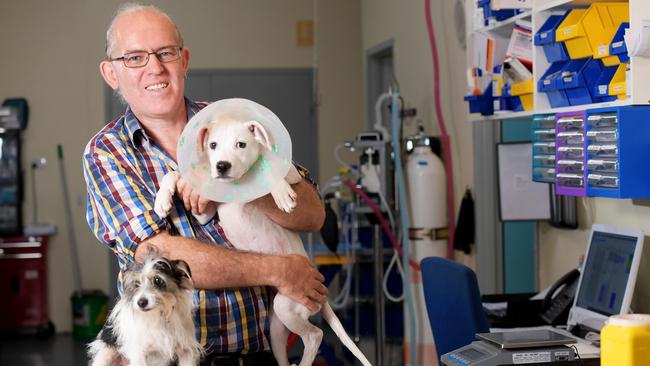
Sadly, Stephen says, most of the injuries he sees are caused by people.
“One way or another almost all of the animals that come into us are a result of habitat loss or injury from animals or cars,” he says.
“The other common thing is actually dog attacks and dog fights.”
As so much of his life has been dedicated to helping animals, it’s no surprise that Stephen met his partner, Andrea Roske, through the clinic.
Andrea volunteers with Wildcare and is the primary bat carer in the Northern Territory.
“We both bring work home,” Stephen laughs.
There are about 65 bats on the couple’s Virginia property, as well as dogs, chickens and ducks.
Bats that get hurt on wire fences have a long recovery time — often taking 6-12 months before they are ready to be returned to the wild — so it’s common for Andrea to be hand rearing the babies.
“I’ve got seven dogs — all rescued,” Stephen says.
“Seven sounds like a lot of dogs, but it’s under 50kg of dog so I figure that’s okay.
“I’m nowhere near my own weight in dog.”
All of them sleep on Stephen’s bed, which doesn’t give the 47-year-old vet much space, but he wouldn’t have it any other way.
Even Stephen’s holidays are motivated by animals.
Last year, he travelled to Naru, a tiny island northeast of Darwin which is a base for Australia’s refugee processing camps. As far as Stephen is aware, he’s the first person to desex dogs there.
Looking forward, Stephen has no plans of slowing down.
“I can’t imagine retirement will be much different,” he laughed.
“If I retire I will probably be doing the same things, I may just not be getting paid for them.”

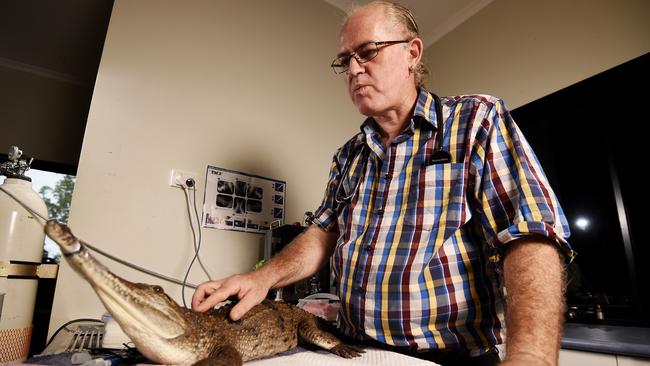
Add your comment to this story
To join the conversation, please log in. Don't have an account? Register
Join the conversation, you are commenting as Logout
‘It’s a coup’: ‘Terminated’ Alice Springs principal’s explosive allegations
The former principal of troubled Alice Springs school is alleging he was sacked after standing his ground over a proposal which is going to be ‘a sh-t show’.
Gaps in Darwin maternity services highlighted through stories of loss
Darwin families are making plans to leave the NT as shocking testimonies reveal gaps in maternity care, with some mothers seeking help four times before tragedy struck.